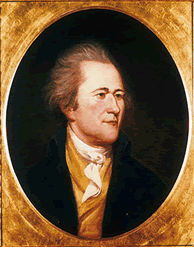Learning about the “Oxford Army”
The youngest child was John Locke, born in 1765. He had a peripatetic life after the Revolution, not marrying and moving north to Maine and west to Northampton before his death at age thirty-four.
The family history, Book of the Lockes, also stated he “was a soldier in the Oxford army.”
What the heck was that? I wondered. Most of the references to the phrase that I found went back to the English Civil War, when the college city of Oxford was the military stronghold of the Royalists. But it turns out that Massachusetts hosted its own “Oxford army.”
In the late 1790s the U.S. of A. went through some friction with France, then governed by the Directory. Eventually this low-level conflict was called the “quasi-war.” At the time, however, some people wanted to get ready for real military action.
One product of this period was the U.S. Navy, recommissioned after the Confederation Congress had done away with this form of national military to save costs. The U.S.S. Constitution was one of the frigates launched in that push, and it’s still with us, along with the larger navy.
In May and July 1798 Congress authorized President John Adams to beef up the army as well. One measure increased the still-authorized U.S. Army by over 10,000 men, these new soldiers for a while called the Additional Army. But enough citizens were worried about the army becoming too large that the government needed to assure them with a different approach.
Thus, Congress founded a parallel force of 10,000 men, the Provisional Army of the United States. Later this was superseded by the Eventual Army of the United States, which could be as large as 30,000. This force was authorized to last only as long as the crisis with France—that was the provision or event that defined it.
As further reassurance to the populace, George Washington was brought out of retirement to be the nominal commander of all the U.S. armies. The regular army already had its command structure. But for the new Provisional Army, operational command fell to inspector general Alexander Hamilton. He brought in William North as his adjutant general.
It took a while for the Provisional/Eventual Army to commission officers, so those officers didn’t start recruiting men until May 1799. In the next several months, before Congress decided that peace with France was at hand, that force grew to a little more than 4,000 soldiers. That army had three sites for training: Harper’s Ferry, Virginia, in the south and Plainfield, New Jersey, for the middle states.
And the third Provisional Army campsite, for troops hailing for the New England states, was in the Massachusetts town of Oxford.




